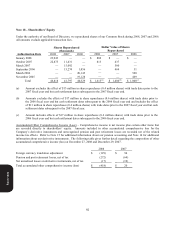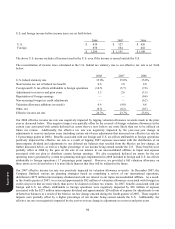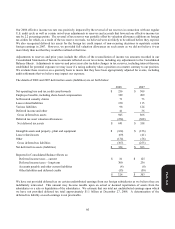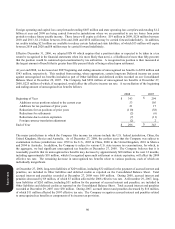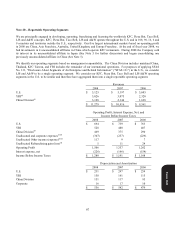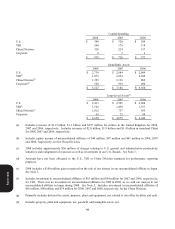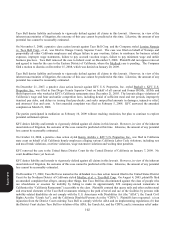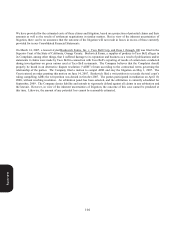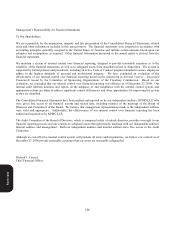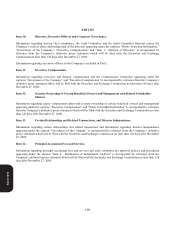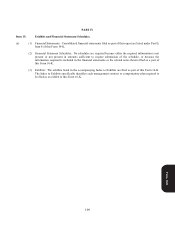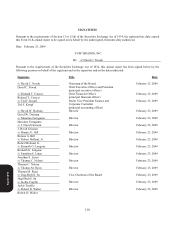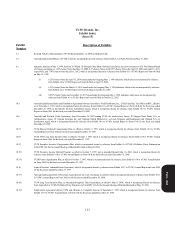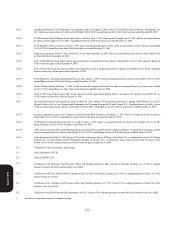Pizza Hut 2008 Annual Report Download - page 224
Download and view the complete annual report
Please find page 224 of the 2008 Pizza Hut annual report below. You can navigate through the pages in the report by either clicking on the pages listed below, or by using the keyword search tool below to find specific information within the annual report.
102
Taco Bell denies liability and intends to vigorously defend against all claims in this lawsuit. However, in view of the
inherent uncertainties of litigation, the outcome of this case cannot be predicted at this time. Likewise, the amount of any
potential loss cannot be reasonably estimated.
On November 5, 2008, a putative class action lawsuit against Taco Bell Corp. and the Company styled Loraine Naranjo
vs. Taco Bell Corp., et al., was filed in Orange County Superior Court. The case was filed on behalf of Naranjo and
purportedly all other California employees and alleges failure to pay overtime, failure to reimburse for business related
expenses, improper wage statements, failure to pay accrued vacation wages, failure to pay minimum wage and unfair
business practices. Taco Bell removed the case to federal court on December 5, 2008. Plaintiffs did not oppose removal
and agreed to transfer the case to the Eastern District of California, where the Medlock case is pending. The Company
filed a motion to dismiss on December 15, 2008, which was denied on January 20, 2009.
Taco Bell denies liability and intends to vigorously defend against all claims in this lawsuit. However, in view of the
inherent uncertainties of litigation, the outcome of this case cannot be predicted at this time. Likewise, the amount of any
potential loss cannot be reasonably estimated.
On December 21, 2007, a putative class action lawsuit against KFC U.S. Properties, Inc. styled Baskall v. KFC U.S.
Properties, Inc., was filed in San Diego County Superior Court on behalf of all current and former RGMs, AUMs and
Shift Supervisors who worked at KFC's California restaurants since December 21, 2003. The lawsuit alleges violations of
California’s wage and hour and unfair competition laws, including denial of sufficient meal and rest periods, improperly
itemized pay stubs, and delays in issuing final paychecks, and seeks unspecified amounts in damages, injunctive relief,
and attorneys' fees and costs. A first amended complaint was filed on February 5, 2008. KFC answered the amended
complaint on March 21, 2008.
The parties participated in mediation on February 10, 2009 without reaching resolution, but plan to continue to explore
potential settlement options.
KFC denies liability and intends to vigorously defend against all claims in this lawsuit. However, in view of the inherent
uncertainties of litigation, the outcome of this case cannot be predicted at this time. Likewise, the amount of any potential
loss cannot be reasonably estimated.
On October 14, 2008, a putative class action styled Kenny Archila v. KFC U.S. Properties, Inc., was filed in California
state court on behalf of all California hourly employees alleging various California Labor Code violations, including rest
and meal break violations, overtime violations, wage statement violations and waiting time penalties.
KFC removed the case to the United States District Court for the Central District of California on January 7, 2009. No
court deadlines have yet been set.
KFC denies liability and intends to vigorously defend against all claims in this lawsuit. However, in view of the inherent
uncertainties of litigation, the outcome of this case cannot be predicted at this time. Likewise, the amount of any potential
loss cannot be reasonably estimated.
On December 17, 2002, Taco Bell was named as the defendant in a class action lawsuit filed in the United States District
Court for the Northern District of California styled Moeller, et al. v. Taco Bell Corp. On August 4, 2003, plaintiffs filed
an amended complaint that alleges, among other things, that Taco Bell has discriminated against the class of people who
use wheelchairs or scooters for mobility by failing to make its approximately 220 company-owned restaurants in
California (the “California Restaurants”) accessible to the class. Plaintiffs contend that queue rails and other architectural
and structural elements of the Taco Bell restaurants relating to the path of travel and use of the facilities by persons with
mobility-related disabilities do not comply with the U.S. Americans with Disabilities Act (the “ADA”), the Unruh Civil
Rights Act (the “Unruh Act”), and the California Disabled Persons Act (the “CDPA”). Plaintiffs have requested: (a) an
injunction from the District Court ordering Taco Bell to comply with the ADA and its implementing regulations; (b) that
the District Court declare Taco Bell in violation of the ADA, the Unruh Act, and the CDPA; and (c) monetary relief under
Form 10-K


